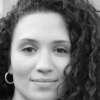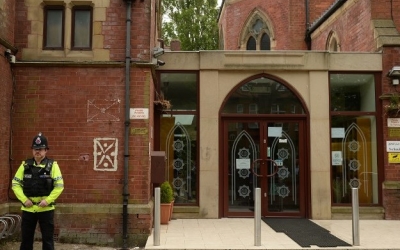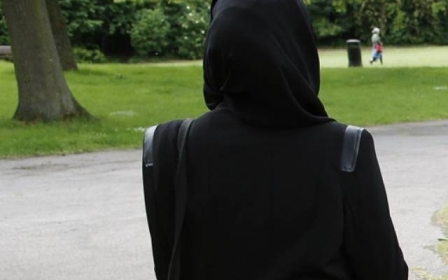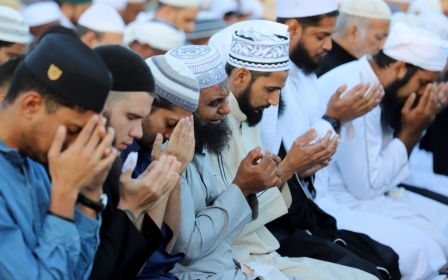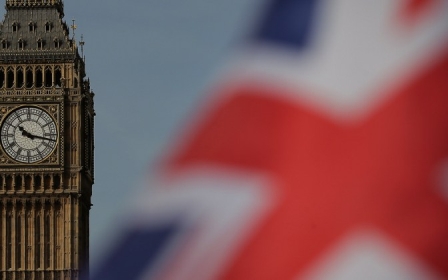Warwick Occupy: How students can fight back to reclaim free speech

Debate over free speech in universities and the need to curb attempts to silence controversial opinions are rife in the media.
Yet what is strikingly absent from these public conversations about education is a recognition of the heavy-handed policies imposed by the state and university managers, which target activists, Muslim students, and other racialised groups.
It is both deeply frustrating and insulting that our government, and by extension the institutions it has forced to enact racist and draconian policies such as Prevent - including universities, hospitals, schools and even mental health providers - continue to proclaim themselves as protectors of free speech, the so-called bastion of any free and democratic society.
State-sponsored repression
For years, campaigners have been speaking out against the use of educational spaces as extensions of the state’s counter-extremism apparatus.
New MEE newsletter: Jerusalem Dispatch
Sign up to get the latest insights and analysis on Israel-Palestine, alongside Turkey Unpacked and other MEE newsletters
The government has the audacity to claim that it seeks to preserve freedom of speech, despite heavily encouraging repression on campuses through the screening of speakers, cancellation of events by student societies, and policing of student and staff-led dissent.
And the issue of shutting down spaces for discussions, debates and other forms of active political expression has been getting worse across higher education institutions.
Last year, students at the University of Westminster led a week-long action over discriminatory practices. They felt forced to disrupt business as usual, because groups that vocally supported Palestine and opposed Islamophobia were being routinely targeted through Prevent. Over-policing had become common practice, going as far as installing cameras in Muslim prayer rooms.
And more recently, students from the University of Warwick occupied their students union after former Israeli army lieutenant colonel, Eyal Dror, was invited to speak on their campus. The event, hosted by the Jewish Israeli Society Warwick, gave Dror a platform to speak on “the incredible story of ‘Operation Good Neighbour’, the [Israeli army]’s humanitarian aid operation in Syria, and how nearly 700 humanitarian operations on the Israeli-Syrian border saved thousands of civilian lives," according to the society’s Facebook post.
After a peaceful student-led disruption of the event itself, which opposed the normalisation of an army whose war crimes are so well documented that they need no repeating here, a headline in the Jewish Chronicle read: “Retired Israeli soldier who helped thousands of Syrians civilians met by ‘hate’ on UK campuses.”
Event sponsor StandWithUs, a group known for targeting pro-Palestine activists, took to social media to express its outrage and peddle the story that pro-Palestine students had “hijacked” the event and were “protesting help for Syria”.
Cynical PR stunt
What the organisation and the student group hosting Dror failed to mention - among other things - was that this has been taking place amid Israel’s continued occupation of Syrian land since 1967. It is more than ironic to claim to be offering help on the “border” while doing so in occupied land.
There is a crisis of free speech on campuses. Debate is being shut down, and opposing viewpoints silenced
In the context of Israel’s continued military operations in Syria, along with its ongoing occupation, it is difficult not to feel that highlighting 700 humanitarian operations - although these are valuable - boils down to a cynical PR stunt.
One also has to wonder how this speaker was approved. Was the process of performing background checks, which student societies require to host external guests, neglected? Or is the complicity of the colonel, through his institution, in the oppression of the Palestinian and Syrian people justified in the eyes of the University of Warwick?
And what about the university’s obligation to safeguard students? The Warwick Arabic Society stated in an email sent to me that hosting this event on campus “felt threatening and angering to everyone due to how the [Israeli army]’s actions have been destabilising not just for Palestinians, but for all Arabs across the region”.
The action taken by Warwick Occupy represents the real fight for preserving freedom of speech, without the threat of hatred or violence. While the Dror event might have been a catalyst, the collective has made this occupation about much wider, institutional forms of oppression and repression.
Calls for structural transformation
The group has stated that both the university and the students union “have demonstrated serious neglect for the welfare and rights of vulnerable students - namely Palestinians, Muslims and other Black and Brown students”.
The occupiers “seek to reclaim our [students union], so that it may start fulfilling its basic duties and obligations to represent us as ethnic minority students”.
A list of demands for the university include an investigation into the racial profiling of protesters, an end to using Prevent to target Palestinians and Muslims, and an institutional divestment from the Israeli occupation, along with wider calls for democratisation, accountability and structural transformation over oppression.
This occupation is taking place at an important time: a strike by the University and College Union (UCU) which ended on Wednesday.
The local UCU branch at Warwick extended solidarity with the occupiers, stating that racist and Islamophobic culture has “permeated our society” and the university, citing the need for “serious, coordinated, and concerted action to tackle these problems.”
Given that academics and staff are expected to implement Prevent and other counter-extremism policies against students - through monitoring, profiling and informing on their students - this support is an example for all to follow.
Hypocrisy and double standards are not limited to Warwick. A few years ago, while Palestine activists were being investigated under Prevent guidelines at London’s SOAS University, pro-Israeli students were allowed to organise an on-campus event with Israeli ambassador Mark Regev, a well-known apologist for war crimes against Palestinian and Lebanese civilians.
He required the presence on campus of armed personnel and demanded that the list of attendees be forwarded to the embassy. When the students’ union refused to host the event, the university stepped in and conceded to Regev’s demands.
Crisis of free speech
Over the past decade, under the guise of safeguarding students and fighting an ill-defined radicalisation, we have seen an intensification of the institutionalised targeting of dissenting people, groups and organising spaces across the board.
University campuses have been a prime target. Shutting down pro-Palestine and boycott, divestment and sanctions (BDS) events; targeting already marginalised and profiled activists of colour who take on institutional oppression; and normalising Islamophobia are not unfortunate consequences of these policies - they are its political project.
Even criticising Prevent can be taken as a sign of radicalisation.
We have to take back our places of learning and fight for the kind of education, and the kind of society that we want to see
There is a crisis of free speech on campuses. Debate is being shut down, and opposing viewpoints silenced. This is not coming from “snowflake” millennials, but from the state and its apparatuses.
In such a context, Warwick students and staff can show us the way. We have to take back our places of learning and fight for the kind of education, the kind of institutions, and the kind of society that we want to see.
The views expressed in this article belong to the author and do not necessarily reflect the editorial policy of Middle East Eye.
Middle East Eye delivers independent and unrivalled coverage and analysis of the Middle East, North Africa and beyond. To learn more about republishing this content and the associated fees, please fill out this form. More about MEE can be found here.


